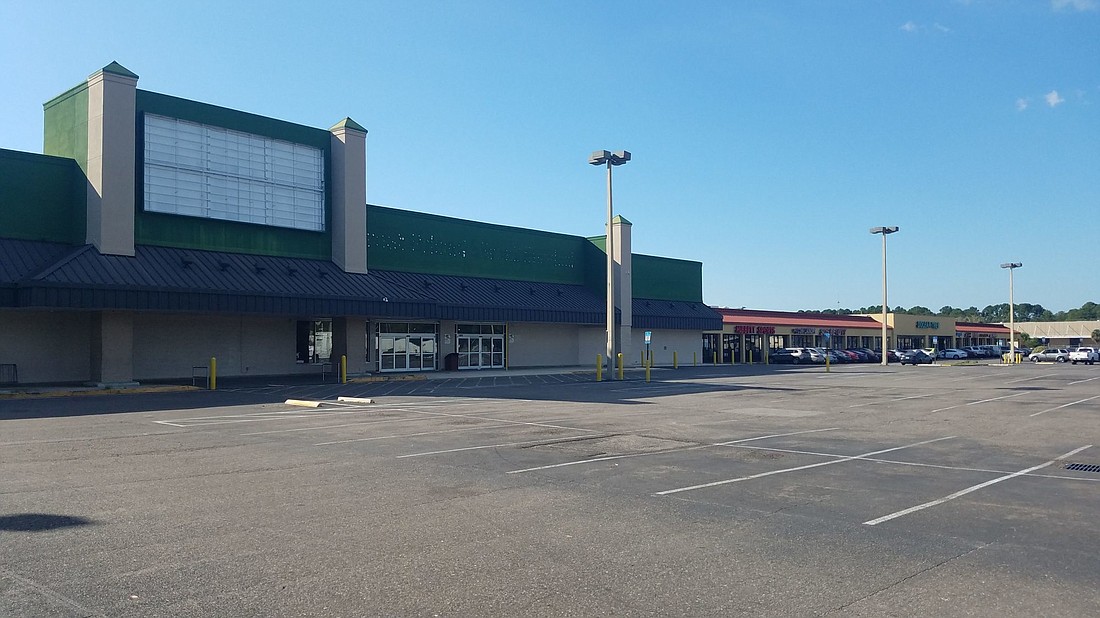
After sitting empty for nearly two years, the former Harveys Supermarket in the Commonwealth Shopping Center in Northwest Jacksonville will reopen as Rowe’s IGA.
City Council approved a $750,000 grant Tuesday night to partially finance renovations to open the Rowe’s IGA Supermarket. Ordinance 2019-0767 passed unanimously as part of the consent agenda.
The bill provides taxpayer-backed incentives to Commonwealth landlord Saglo Development Corp. of Miami to partially finance a $3.5 million renovation of the 49,000-square-foot store at 1020 Edgewood Ave. N. with Rowe’s.
Rowe’s IGA Supermarkets CEO Rob Rowe said Oct. 7 he anticipates a $5 million total investment in the project. He expects the landlord will invest $1 million and Rowe will spend the remaining $4 million.
Work will include interior remodeling and installation of fixtures, point-of-sale equipment, refrigeration cases and other upgrades. Exterior work will encompass parking lot improvements, signage, building painting and landscaping.
The shopping center also has a 475-space surface parking lot.
Rowe said there isn’t a full-service grocery store within 2 to 3 miles of the location. “Definitely they need a store in that area,” he said.
The store will offer groceries including deli, bakery, seafood and meat departments. There will not be a pharmacy.
Saglo and Rowe’s must obtain a certificate of occupancy from the city before the grant is issued. The development agreement will include a clawback provision of $150,000 per year over five years to ensure the project operates as a grocery store.
The $750,000 will be pulled from $3 million in the Northwest Jacksonville Economic Development Fund earmarked for healthy food affordability, education and promotional programming addressing food deserts.
An urban food desert is an area without a grocery store within a mile.
Saglo purchased the 19-acre property and 81,500-square-foot building in February 2017 for $5.2 million through Commonwealth SDC LLC, according to Duval County Property Appraiser records.
Saglo owns 20 shopping centers with about 1.75 million rentable square feet in Florida and Georgia.
Food desert pilot programs
A second bill approved 19-0 on Tuesday, Ordinance 2019-768, appropriates $300,000 to finance four pilot programs to improve Northwest Jacksonville residents’ access to fresh food.
The city will work with the Feeding Northeast Florida nonprofit on a $200,000 mobile markets program to deploy refrigerated fresh food trailers into food deserts throughout the area.
The nonprofit was founded in 2014. Among other programs, it distributes more than 22,000 pounds of fresh food and produce to partners including the City Rescue Mission, Trinity Rescue Mission, Beaches Emergency Assistance Ministry, The Salvation Army and the Sulzbacher center.
The city will buy one trailer and a truck at no more than $200,000 while Feeding Northeast purchases the second trailer.
The remaining $100,000 will pay for the Jacksonville Transportation Authority to provide residents within the modified ReadiRide boundary with discounted transportation from their homes to a grocery store within the boundary and back.
The second program will provide a one-time $5,000 grant to existing retail businesses not offering fresh foods, vegetables or meats to purchase “open air” refrigeration units, which are those used in grocery stores to display those products.
Two additional programs in the bill do not include immediate city funding. One will provide a subsidy to food delivery companies that ship to locations within the Interstate 295 loop within the Northwest Jacksonville boundary.
The second will provide a one-time $5,000 grant to existing retail businesses not offering fresh foods, vegetables or meats to purchase “open air” refrigeration units, which are those used in grocery stores to display those products.
The food desert program budget will have $1.84 million remaining once the programs are funded.